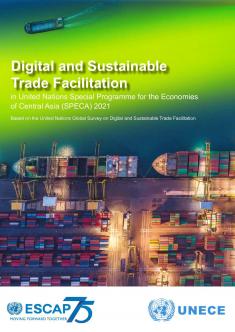
The report presents results of the 2021 United Nations Global Survey on Digital and Sustainable Trade Facilitation for six participants in United Nations Special Programme for the Economies of Central Asia (SPECA), namely Afghanistan, Azerbaijan, Kazakhstan, Kyrgyzstan, Tajikistan and Uzbekistan, reviewing the progress of trade facilitation reforms and provides a detailed analysis based on 58 trade facilitation measures covering both binding and non-binding WTO TFA measures, as well as measures beyond the scope of WTO TFA.
The analysis presented in this report, based on the latest data available, confirms that digital trade facilitation measures can result in significant benefits to the countries in the subregion. Full Implementation of binding and non-binding WTO TFA measures could decrease trade costs by more than 11%. On the other hand, digital trade facilitation measures enabling the seamless electronic exchange of trade data and documents across borders will help significantly reduce trade costs by more than 20% for SPECA in a full implementation scenario.
Moving forward, trade facilitation implementation may be seen as a step-by-step process, based on the groups of measures included in the survey i.e., enhancing the institutional arrangement; establishing transparency; implementing efficient trade formalities; development of paperless trade systems, followed by enabling trade data and documents within these systems, including national Single Windows, to be safely and securely used and reused by authorized stakeholders along the international supply chain. Especially in the case of paperless and cross-border paperless trade, countries need to work together to develop and implement the legal and technical protocols needed for the seamless exchange of regulatory and commercial data and documents within and between countries.
The report was jointly prepared by ESCAP and ECE.
For more reports, please visit untfsurvey.org